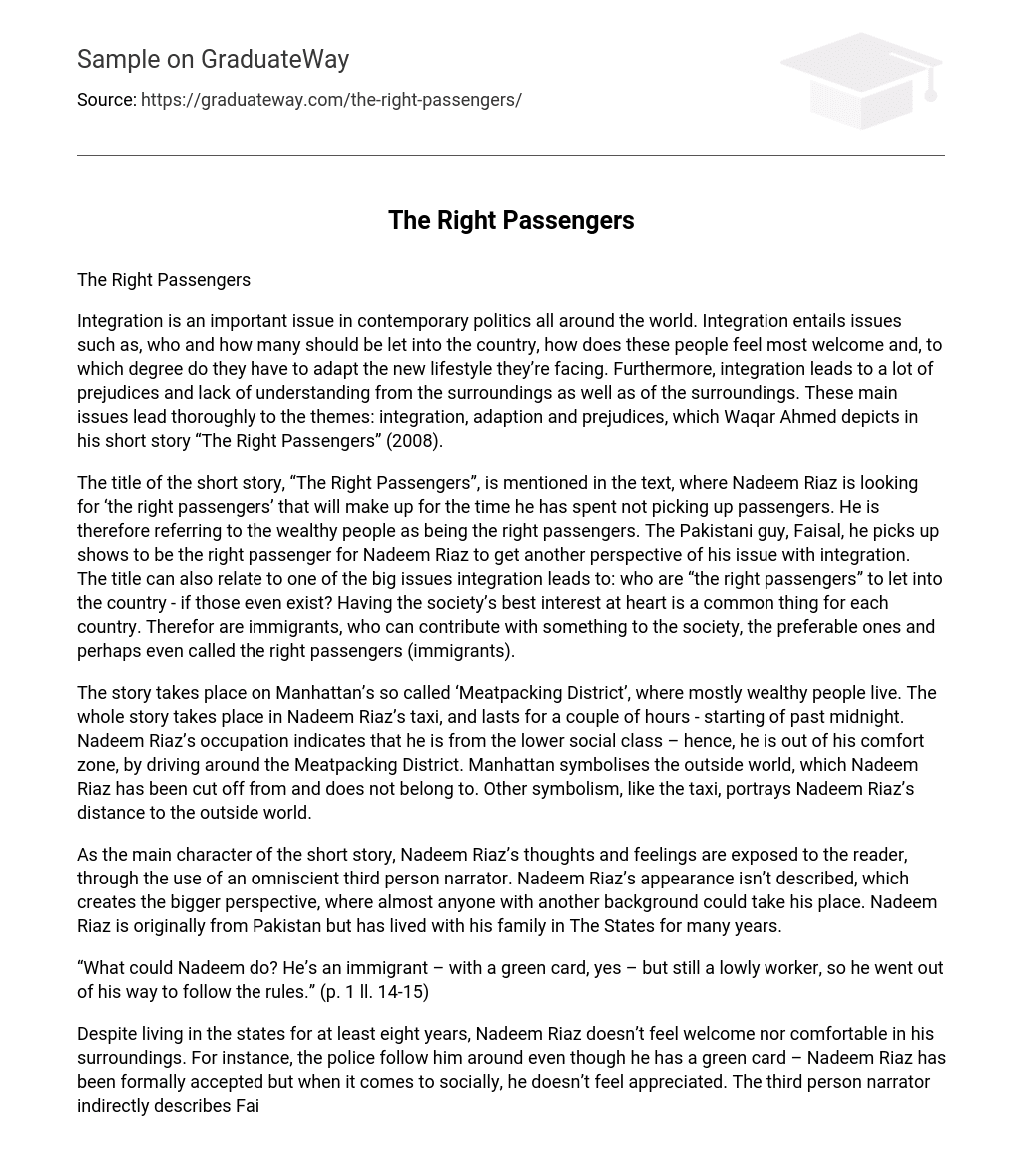Integration is an important issue in contemporary politics all around the world. Integration entails issues such as, who and how many should be let into the country, how does these people feel most welcome and, to which degree do they have to adapt the new lifestyle they’re facing. Furthermore, integration leads to a lot of prejudices and lack of understanding from the surroundings as well as of the surroundings. These main issues lead thoroughly to the themes: integration, adaption and prejudices, which Waqar Ahmed depicts in his short story “The Right Passengers” (2008).
The title of the short story, “The Right Passengers”, is mentioned in the text, where Nadeem Riaz is looking for ‘the right passengers’ that will make up for the time he has spent not picking up passengers. He is therefore referring to the wealthy people as being the right passengers. The Pakistani guy, Faisal, he picks up shows to be the right passenger for Nadeem Riaz to get another perspective of his issue with integration. The title can also relate to one of the big issues integration leads to: who are “the right passengers” to let into the country – if those even exist? Having the society’s best interest at heart is a common thing for each country. Therefor are immigrants, who can contribute with something to the society, the preferable ones and perhaps even called the right passengers (immigrants).
The story takes place on Manhattan’s so called ‘Meatpacking District’, where mostly wealthy people live. The whole story takes place in Nadeem Riaz’s taxi, and lasts for a couple of hours – starting of past midnight. Nadeem Riaz’s occupation indicates that he is from the lower social class – hence, he is out of his comfort zone, by driving around the Meatpacking District. Manhattan symbolises the outside world, which Nadeem Riaz has been cut off from and does not belong to. Other symbolism, like the taxi, portrays Nadeem Riaz’s distance to the outside world.
As the main character of the short story, Nadeem Riaz’s thoughts and feelings are exposed to the reader, through the use of an omniscient third person narrator. Nadeem Riaz’s appearance isn’t described, which creates the bigger perspective, where almost anyone with another background could take his place. Nadeem Riaz is originally from Pakistan but has lived with his family in The States for many years.
“What could Nadeem do? He’s an immigrant – with a green card, yes – but still a lowly worker, so he went out of his way to follow the rules.” (p. 1 ll. 14-15)
Despite living in the states for at least eight years, Nadeem Riaz doesn’t feel welcome nor comfortable in his surroundings. For instance, the police follow him around even though he has a green card – Nadeem Riaz has been formally accepted but when it comes to socially, he doesn’t feel appreciated. The third person narrator indirectly describes Faisal by what he says or does. The only thing Nadeem Riaz knows about Faisal is that he’s also from Pakistan. Though, he can tell from the sound of Faisal’s voice that he is in his twenties. Faisal is young, happy, overbearing and comfortable in contrast to Nadeem Riaz. Faisal’s appearance isn’t described either, because it’s not Faisal in person Nadeem Riaz is unsatisfied with, it’s what he stands for – a well-assimilated Pakistani in the western world.
Nadeem Riaz is judgemental of Faisal and the upper class he represents, because he doesn’t feel respected, as he was back in Pakistan. Throughout the story the conflict between Nadeem Riaz and Faisal develops into something personal. Nadeem Riaz accuses Faisal for bringing shame on God and their culture by misbehaving in the backseat of his taxi. Furthermore, he doesn’t understand why Faisal’s parents haven’t married him off yet – he doesn’t understand the western culture of which Faisal seems to have adapted.
“So you agree, you are using this place?”
“It is a small thing, gentleman, for what I have to tolerate, like activities in the back seat of my taxi,”…
(p. 5 l32-133)
Faisal accuses Nadeem Riaz for using the country, which in general is, what many people accuses the immigrants for doing.
“Funny, Nadeem thinks, being in this country – he’s expected to act a certain way, how, exactly, he doesn’t know. He gets scraps, hints, here and there, and, just as he’s about to put the puzzle together, the instructions, the conversations, ends abruptly. So, then, he’ll just continue to do his job.” (p. 5 ll. 151-154)
Nadeem Riaz represents the un-adapted immigrant, who has to tolerate a lot in his life, even though he wants to go back home to Pakistan. He is cross with himself, because he can’t adapt to the culture and the environment of which he is situated. He is longing for Pakistan and the safety it brought to him and his family.
“Gentleman, I am scared one of my children will turn into you when he grows up.” (p. 4 l. 129)
He is full of such hatred against the American society that it affects Faisal, even though it isn’t Faisal as a person he dislikes, but the outside world. He keeps fighting for his culture contrary Faisal, whom Nadeem Riaz belief, has given up on and lost his true culture and “tribal civility”. Towards the resolution, Faisal exemplifies the “right passenger”, who makes Nadeem Riaz realize that society isn’t the problem but he is. He has to make an effort to fit in, but on the same time hold on to his roots.
Due to the diversity of cultures in society nowadays, many people with different cultures live along side of each other each day. Misunderstanding, communication and prejudices will be present like it is between Nadeem Riaz and Faisal. Despite this, similarities between the different cultures eliminate the barriers and prejudices that keep the worlds apart.





